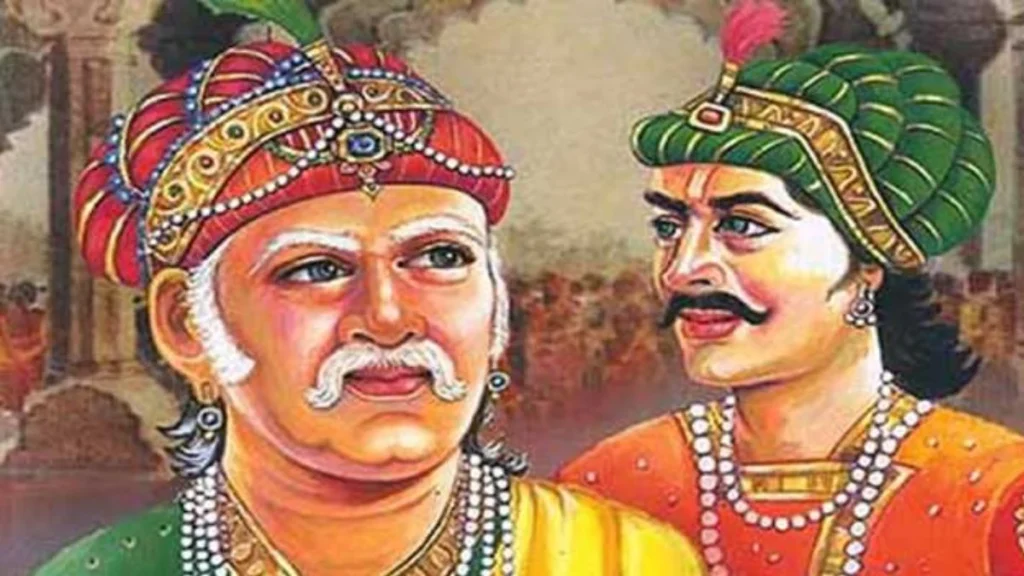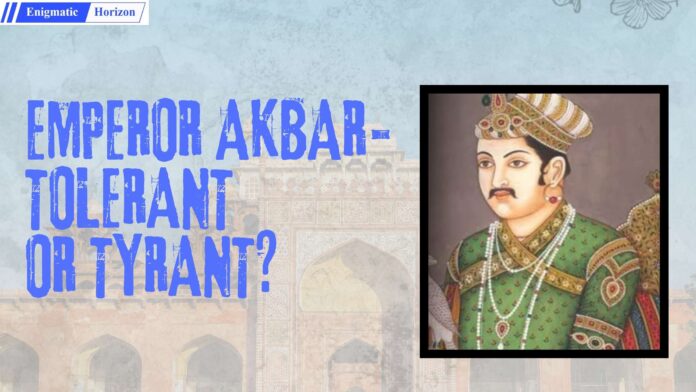When discussing Mughal rulers, we all know that Aurangzeb is considered the most violent and oppressive, known for his acts of genocide of non-Muslims, destruction of Hindu temples and harsh enforcement of Islamic laws. He is frequently cited as the worst example of Mughal rule. In contrast, his great grandfather Akbar is widely glorified as a secular and benevolent king, often portrayed as one of the most enlightened rulers who embraced all religions. However, historical records show that things are not that simple. While some of his policies set positive examples Akbar’s early years were actually marked by violence and bloodshed, and his later inclination towards religious tolerance was a gradual shift rather than an inherent trait. Akbar was not without flaws. Was Akbar secular or was he just another tyrant? Let us examine whether Akbar was truly secular, and if truly deserves the glorified status given to him by movies and history textbooks.
Akbar’s Early Years: Violence and Bloodshed
Akbar was not always the tolerant and inclusive ruler he is often made out to be. His early reign was characterized by military expansion and brutality. One of the most infamous incidents of his rule was the massacre of 40,000 Hindus following his conquest of Chittorgarh in 1568. After a prolonged siege, the fort fell to Akbar’s forces, and he ordered the mass slaughter of its defenders and civilians. Similarly, in 1561, after the conquest of Malwa, his forces reportedly massacred thousands. Such actions indicate that Akbar, at least in the initial years of his rule, was no different from other expansionist monarchs who gave priority to military dominance and growing his own empire.
While Akbar later implemented policies that seemed more progressive and inclusive, his early rule shows that he wasn’t always a secular and benevolent king. His transformation into a tolerant ruler was not an innate quality but could be a calculated political strategy.
Was Akbar Secular? Gradual Shift Towards Religious Tolerance?
It was only in the latter part of his reign that Akbar started showing an interest in spirituality and philosophy. One of the most significant influences on this shift was his Hindu minister, Birbal. Akbar’s reliance on Birbal, a devout Hindu, was unusual for a Muslim ruler, as Birbal became one of his most trusted advisors, surpassing even his Muslim ministers in influence. It is likely that Birbal played a crucial role in shaping Akbar’s policies of religious accommodation.
Among Akbar’s most remarkable decisions was his ban on cow slaughter and beef consumption, a move that was unexpected from a Muslim ruler. He not only prohibited cow slaughter in his empire but also personally gave up eating beef, demonstrating a rare level of respect for Hindu and Jain beliefs. In fact, he also took only vegetarian meals for three days of the week. This can set an example for modern-day Muslims, especially in India, on how a ruler should respect the religious sentiments of the majority population.

Akbar’s inclination towards religious tolerance also led to the establishment of the Din-i Ilahi, a syncretic faith that blended elements of Islam, Hinduism, Zoroastrianism, and Christianity. While it was not widely adopted, it showed that in his later life, he evolved as a human being, as he was willing to evolve beyond Islamic fanaticism.
Akbar’s Flaws: A Less-Than-Ideal Role Model
Despite his progressive policies, Akbar was far from a perfect ruler. One of his most controversial aspects was his personal life, particularly his polygamous marriages and vast harem. He married multiple Hindu princesses, a practice often portrayed as an act of religious harmony. However, in reality, these marriages were more about political alliances than genuine inclusivity.
His harem, consisting of hundreds of women, was another aspect that raises ethical concerns. While such practices were common among monarchs of that era, it shows that Akbar is not an ideal figure to look up to from a moral standpoint. He was a product of his time, following customs that would be considered highly questionable by modern ethical standards.
That being said, while Akbar may not be an ideal role model in every aspect, there are certainly things that people of various faiths can learn from him. His emphasis on religious tolerance, his ability to listen to and respect advisors from different faiths, and his practical approach to governance are qualities that remain relevant today.
A Complex Legacy
Akbar’s legacy is complex. While he was undoubtedly one of the more enlightened rulers of his time, his early years were marked by violence, and his tolerance was a gradual political evolution rather than an inherent trait. His decision to ban a cow slaughter and his reliance on a Hindu minister like Birbal show that he did evolve as a human being, and also showed admirable level of respect for religious coexistence. However, his personal flaws, including polygamy and maintaining a harem, prevent him from being an ideal figure in every sense.
Ultimately, Akbar was neither a perfect secular hero nor a complete tyrant. He was a ruler who adapted to the realities of his time, who also made efforts to evolve as a human being. His reign offers both lessons and cautionary tales for modern leaders and historians alike.
